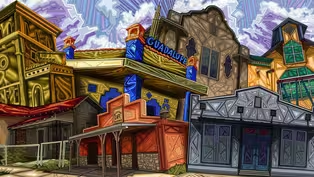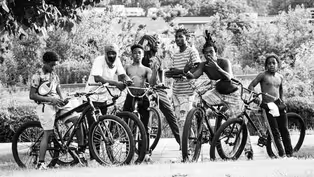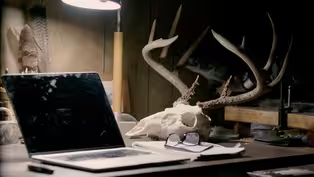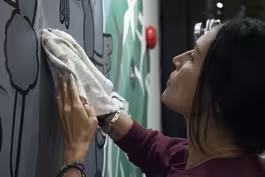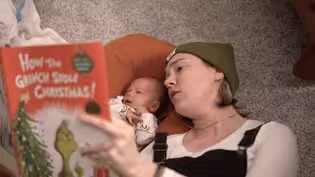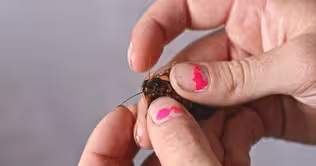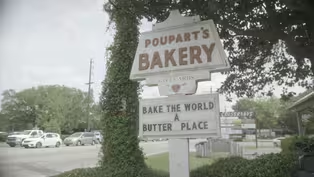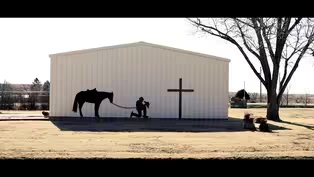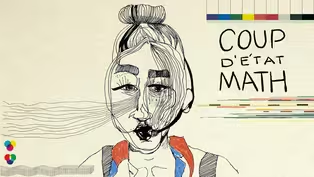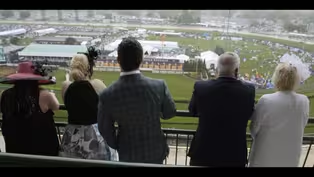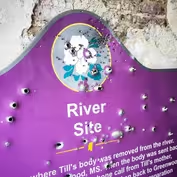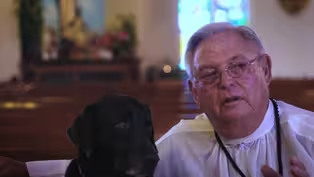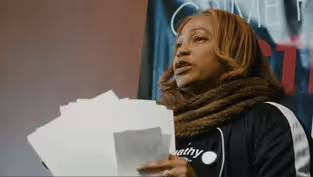
Winn
Special | 16m 55sVideo has Closed Captions
Pamela Winn fights to end the shackling of incarcerated pregnant people in Georgia.
After experiencing neglect and traumatic loss while pregnant in prison, Pamela Winn becomes an activist, leading hundreds of thousands to support the Dignity Bill to end the shackling of pregnant people in prison. "WINN" exposes the horrifying experience that incarcerated pregnant people endure and documents Pamela’s mission to end shackling in the South.
Problems playing video? | Closed Captioning Feedback
Problems playing video? | Closed Captioning Feedback
Support for Reel South is made possible by the National Endowment for the Arts, the Center for Asian American Media and by SouthArts.

Winn
Special | 16m 55sVideo has Closed Captions
After experiencing neglect and traumatic loss while pregnant in prison, Pamela Winn becomes an activist, leading hundreds of thousands to support the Dignity Bill to end the shackling of pregnant people in prison. "WINN" exposes the horrifying experience that incarcerated pregnant people endure and documents Pamela’s mission to end shackling in the South.
Problems playing video? | Closed Captioning Feedback
How to Watch REEL SOUTH
REEL SOUTH is available to stream on pbs.org and the free PBS App, available on iPhone, Apple TV, Android TV, Android smartphones, Amazon Fire TV, Amazon Fire Tablet, Roku, Samsung Smart TV, and Vizio.
Providing Support for PBS.org
Learn Moreabout PBS online sponsorshipMore from This Collection
Video has Closed Captions
RUBIO uses art to share folklore, remember friends, and celebrate the Westside community. (7m 26s)
Video has Closed Captions
A bowhunter in the Arkansas Ozarks meditates on the Cycle of Life after an animal harvest. (5m 45s)
MISS CHELOVE: From Java to the Streets of D.C.
Video has Closed Captions
Artist MISS CHELOVE shares stories from her life growing up in the D.C. punk scene. (15m 33s)
Video has Closed Captions
A filmmaker records her wife’s introduction to motherhood, finding purpose in the process. (9m 51s)
Video has Closed Captions
Four women bond over crickets, worms, and roaches on an insect farm in Labelle, Florida. (14m 16s)
Video has Closed Captions
Francois starts a bakery in Lafayette, LA with a deep connection to his french culture. (8m 8s)
Video has Closed Captions
Darrouzett, Texas is a 100-year-old homestead community full of hope and nostalgia. (12m 27s)
Video has Closed Captions
Four immigrant stories: a fight to be born, to survive, find your place, and to maintain. (8m 45s)
Video has Closed Captions
A portrait of workers and revelers at the fastest 2 minutes in sports, the Kentucky Derby. (14m 43s)
Video has Closed Captions
A short film exploring the vandalism of signs in Mississippi marking Emmett Till’s death. (3m 43s)
Video has Closed Captions
The impending border wall threatens a chapel and a local priest in Mission, Texas. (10m 15s)
Providing Support for PBS.org
Learn Moreabout PBS online sponsorship[ambient music] [gentle music] - What are my memories of prison?
Memories of prison are just of loss.
That's it, dark, empty, four walls of nothing.
Go ahead.
Stop being nosy, go on outside.
A lot of people don't really know what shackling is, this is shackling.
The person in my drawing doesn't have a face because it would be too many faces to put there, because it's not just something that happened to me, it's something that happens to lots of women.
[bright music] - [All] Empathy.
- [Interviewer] And what are you hoping to change?
- I'm hoping to stop shackling of incarcerated women that are pregnant in Georgia.
We have these stereotypes of what an incarcerated person looks like, but I'm here to tell you that an incarcerated person looks like the person that's next to you.
Empathy is knowing that incarcerated people in America are people just like you.
They feel just like you.
They love just like you.
They breathe just like you do.
When I got arrested, and I had my first physical during intake, that's when I found out that I was pregnant.
Although they knew I was pregnant, they would still put a chain around my belly, and they would put shackles on my ankles as well.
And one of the days heading out to court, stepping into the van, I miss stepped and I fell.
After the fall, I started sending medical requests stating that I was having problems, and for a couple of weeks they went unanswered.
And then finally, they gave me the courtesy of being honest with me and letting me know that the facility was basically built for men, they didn't anticipate having women and they could do nothing for me.
[gentle music] My call today is with the Georgia Birth Advocacy Coalition.
My part of the conversation is gonna be what it always is because when these conversations come about, they always forget the incarcerated pregnant women.
And so that is the voice that I always bring into the room.
I still get to cheat, I don't have to wear clothes.
If it's put on the scarf, like, yes, I'm dressed.
- [Speaker] Pamela Winn now advocates for the rights and wellbeing of pregnant mothers and formerly incarcerated people.
She is a wonderful person to talk to about how we talk about all of the rights that pregnant people have here in Georgia, but the truth is that pregnant prisoners have almost no rights and they are, if you're in jail, you have [call breaking up].
- I can't hear all that now.
[indistinct words] Someone is apologizing to me for my loss, I thank you so much for your concern.
I'm trying to do this without getting emotional, but it's hard.
[somber music] Every night we would get locked in our cells at 10 o'clock at night.
The only light that shone in just shot across your head up high so you really couldn't see anything, it was very dark in the room.
On this particular day, I had not had anything to drink all day because the water in the drinking fountain was coming out brown.
I was awakened out of my sleep by the contractions.
I'm moaning out in pain and I awake the lady that was in the room with me.
And I remember her screaming in the crack of the door to the other ladies, there's something wrong with Pam, there's something wrong with her baby.
I could hear all of the women beating on the door, screaming to the top of their lungs, trying to get somebody's attention to come in and check on us.
I lay there it seems like forever, and finally the door opens.
When the door opens, it's blood everywhere.
So now not only am I afraid for my baby, I'm afraid for myself.
The correctional staff were debating about what to do with me.
They didn't have a plan, they didn't know what to do.
And I'm like, please, please, please, just call 911 and get me to the doctor.
When I got to the hospital, I was met by the Marshalls who immediately cuffed me to the bed.
And so I spent the rest of my miscarriage shackled to the bed.
Not only shackled to the bed, but there were two male officers in the room with me that were both between my legs, that refused to give me any privacy.
I remember the nurse saying to me, Ms. Winn, you passed your baby, it's not here.
Then she asked the officers where's the linen that Miss Winn bled on, we need that, the baby is there.
And they said to her, "oh, we threw it in the trash" and at that moment my heart is sank.
And out of all the things that I had experienced, and I had been through, for me, I think they had to be the lowest point for me in my life to hear a part of me, my baby, was just thrown in the trash like it was nothing.
I was 25 on this picture, very young me.
My mother was in and out of jail during my childhood, and by the time I got to middle school, high school, she had developed a drug dependency, and I was pretty much responsible for caring for my brother and myself.
I have two sons.
Because of my own upbringing, It was always kind of important to me to do things differently for them.
I was always there and involved.
They were 14 and 16 when I left.
[dog panting] After the miscarriage, they took me back to the facility and I was placed in solitary confinement that they term quote, unquote, medical observation.
[gentle music] Going from the trauma and pain and the mental anguish of losing my baby to now being placed in solitary, and my thoughts were, these people are trying to destroy me.
I had to hold on to who I was and my sons, they were like my main source of motivation.
And that's what I had to keep constantly reminding myself that I gotta make it through this because they're depending on me.
[gentle music] [birds chirping] [gentle music] Feel like I'm dreaming right now.
Since 2012, I have lived with friends, I have lived in hotels.
It's been a long journey to get back to owning my own home.
So down here is considered like an in-law suite which is gonna be actually perfect for when I house the ladies that return home from prison because that's the ultimate plan for this place, so this is the beginning.
And this is what I have been waiting to do, to walk barefoot in my own home.
[gentle music] When I first came home, I wanted everything to just disappear.
There is a lot of shame, a lot of guilt, a lot of embarrassment all wrapped up into failure.
I wanted to forget about that, and just put my life back together and move forward, however, I couldn't.
I tried, but something would always trigger me to think about my baby and just to think that there were gonna be other women coming behind me that were gonna have to go through the same things that I went through, things that just weren't right.
So I knew something had to be done.
[keyboard tapping] [uptempo music] I started a petition with change.org to stop shackling of women in federal prison.
Good morning everybody, I thank you for coming out.
We have an active bill here.
It's HB 345 and it would stop shackling.
And when I started this work, I had no experience or anything dealing with politics, period.
- Who has lobbied before?
So the way it works in Georgia, the easiest way to get in touch with your representatives is what's called on the ropes, and it's just absolute chaos.
[bell chiming] [indistinct chatter] - [Pamela] Okay, thank you.
So she's not in there?
- When they come out, be ready.
Speak from the heart and just make sure that they hear you.
We know as individual people that personal stories are what changed lives.
- I see her, I'm trying to catch her.
We knew we were gonna have to get Republican support.
And my strategy for doing that was I introduced myself to chairwoman Sharon Cooper, I told her my story, and she told me not only would she support, she would host the bill.
- [Newscaster] Pam Winn spent five years in prison, never imagining she'd be lobbying members of Congress in the years after her release.
- I felt like the least that I could do is to fight and try and do something.
- I welcome everyone to our briefing on women in prison seeking justice behind bars.
And today I speak on behalf of the invisible women, and I call them the invisible women because no one wants to talk about the harm that is done to us.
- [Speaker 2] Pamela Winn became the face of the anti-shackle movement in Georgia.
- [Speaker 3] Miss Pam, you took your pain and it turned into passion.
- Everything in the prison is set up for the men.
The prison was created for the men.
I could keep going on and on about what we face as women on the inside that people just don't even think about.
- I can't thank you enough for your heroism.
Turning your wounds into justice action.
- It's happening, I can't believe this.
The update is HB 345 has made it to Rules Committee today to be voted on.
I had no plan to ever tell my own personal story and definitely not repeat my story over and over again.
We're back.
- We are.
- At the White House.
Now I tell it everywhere and unapologetically, even though it hurts.
But what I tell myself is that it's necessary because what I know from my own personal experiences, the price that we pay, it highly exceeds the sentence, and it bar exceeds the crime, and that has to stop.
[gentle music] - The only thing that I don't have over there that drink scotch.
Wide awake today.
- Say I just woke, took a long nap.
[gentle music] - Say, I'm gonna be big trouble, but I'm gonna be good trouble, sweet trouble.
[gentle music] [uptempo music] ♪ [crickets chirping]
Preview: Special | 1m 16s | Pamela Winn fights to end the shackling of incarcerated pregnant people in Georgia. (1m 16s)
Providing Support for PBS.org
Learn Moreabout PBS online sponsorshipSupport for PBS provided by:
Support for Reel South is made possible by the National Endowment for the Arts, the Center for Asian American Media and by SouthArts.
